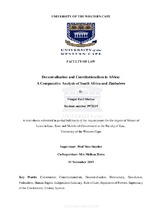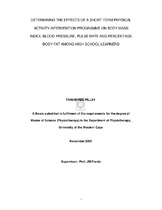Decentralisation and constitutionalism in Africa: A comparative analysis of South Africa and Zimbabwe
| dc.contributor.advisor | Steytler, Nico | |
| dc.contributor.author | Mudau, Fungai Paul | |
| dc.date.accessioned | 2020-06-17T10:38:42Z | |
| dc.date.available | 2020-06-17T10:38:42Z | |
| dc.date.issued | 2020 | |
| dc.identifier.uri | http://hdl.handle.net/11394/7259 | |
| dc.description | Magister Legum - LLM | en_US |
| dc.description.abstract | Since the early 1990s, the move towards decentralisation has been given prominence in African constitutions. Countries that embarked on ambitious decentralisation processes had to make the necessary constitutional reforms. The emergence and proliferation of constitutional entrenchment of decentralisation in Africa was long overdue and thus necessitated by the popular widespread discontent expressed against leaders who ‘personalize power and concentrate it within a privileged clique in the capital city’. While stifling the inroads of liberal democracy, authoritarian rulerships, single-party state systems and military dictatorships contributed immensely to the downward trajectory of political development in post-colonial Africa. Evidently, the intent and purpose for the quest to consolidate the complementary relationship between decentralisation and constitutionalism is aimed at domesticating the Leviathan – the untrammeled ruler. | en_US |
| dc.language.iso | en | en_US |
| dc.publisher | University of the Western Cape | en_US |
| dc.subject | South Africa | en_US |
| dc.subject | Zimbabwe | en_US |
| dc.subject | Africa | en_US |
| dc.subject | Post-colonial Africa | en_US |
| dc.subject | Constitution | en_US |
| dc.subject | Legislation | en_US |
| dc.subject | Comparative analysis | en_US |
| dc.title | Decentralisation and constitutionalism in Africa: A comparative analysis of South Africa and Zimbabwe | en_US |
| dc.rights.holder | University of the Western Cape | en_US |




